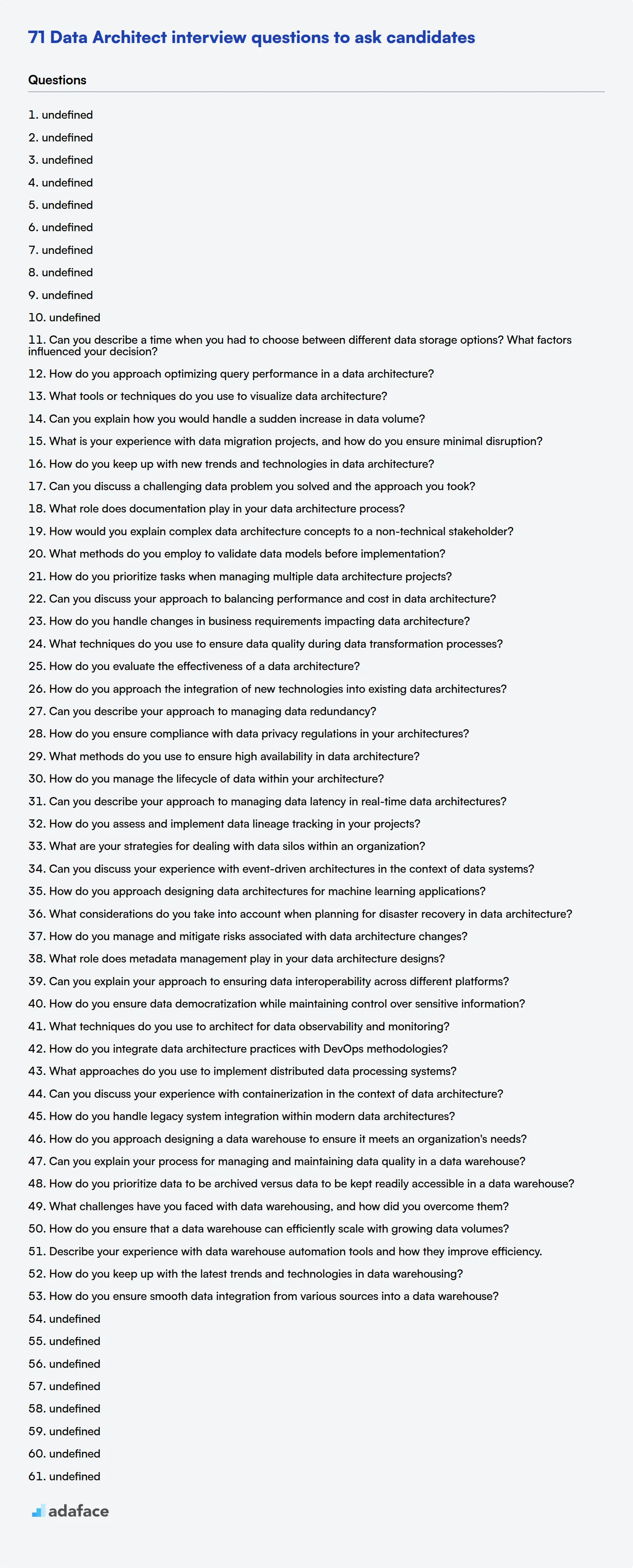Hiring the right Data Architect is crucial for organizations looking to harness the power of data effectively. Asking the right interview questions can help you identify candidates with the necessary skills and experience to design and manage your data infrastructure.
This blog post provides a comprehensive list of Data Architect interview questions, categorized by experience level and specific areas of expertise. From basic concepts to advanced topics, these questions will help you assess candidates' knowledge of data modeling, warehousing, and architectural principles.
By using these questions, you can make informed hiring decisions and build a strong data team. Consider combining these interview questions with a pre-employment assessment to thoroughly evaluate candidates' skills and ensure you're selecting the best fit for your organization.
Table of contents
10 basic Data Architect interview questions and answers to assess applicants
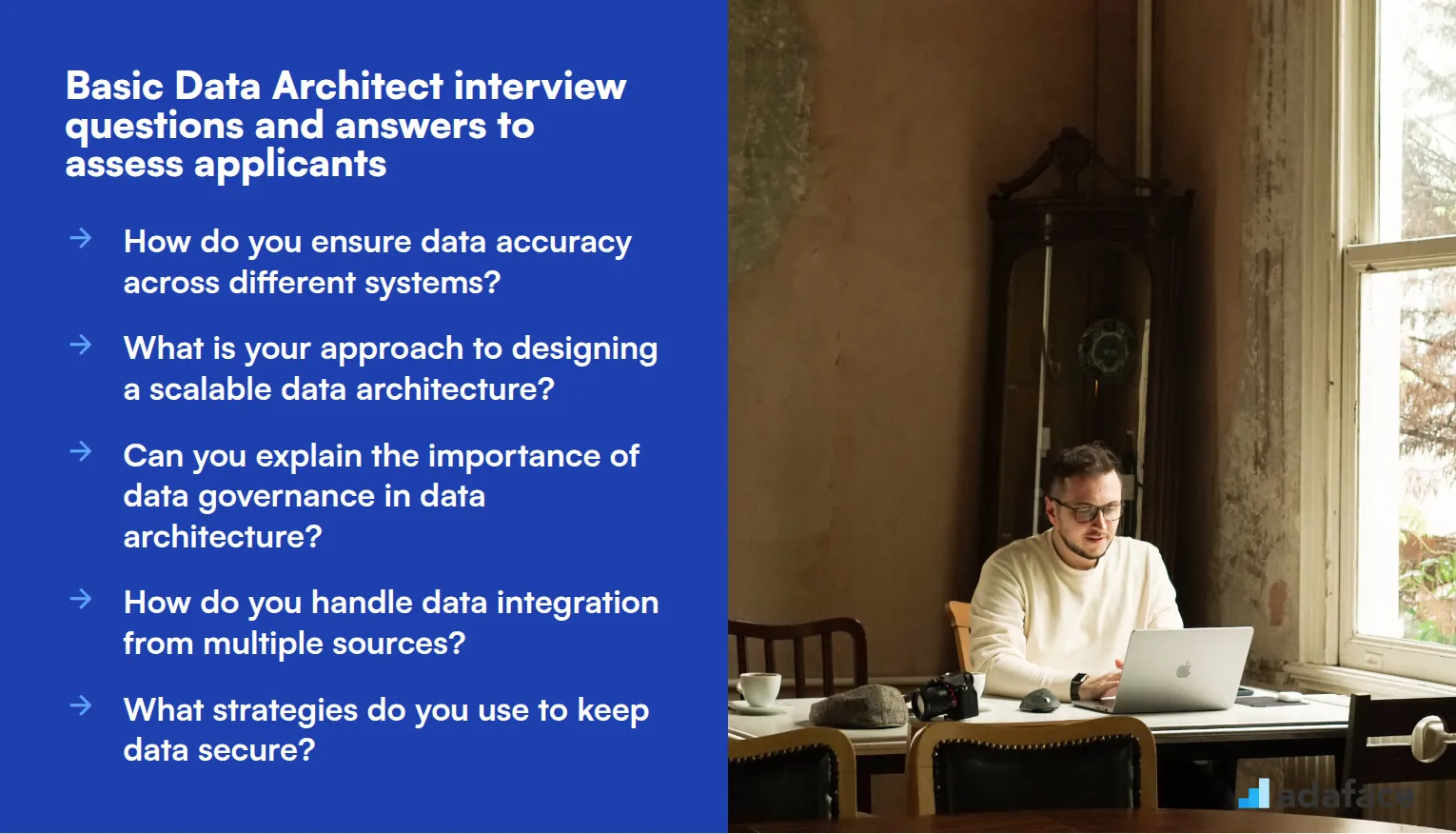
To assess whether candidates possess the foundational understanding and critical thinking skills needed for a Data Architect role, we've curated a list of essential interview questions. This set can help you identify individuals who are not only technically sound but also align with your team's goals and values.
1. How do you ensure data accuracy across different systems?
Ensuring data accuracy across systems involves establishing robust data validation mechanisms and regular audits. This includes implementing data quality checks and using ETL processes to rectify inconsistencies.
Candidates should demonstrate an understanding of maintaining data integrity through proactive management and systematic checks. Look for specifics on how they have achieved this in previous roles and the tools they used.
2. What is your approach to designing a scalable data architecture?
Designing a scalable data architecture involves understanding current data demands and anticipating future growth. It requires choosing the right technologies and structuring data storage to handle increased loads efficiently.
Ideal candidates should discuss their experience with scalable architecture frameworks and provide examples of how they've implemented solutions that support growth. Mention of tools and strategies for scalability is a plus.
3. Can you explain the importance of data governance in data architecture?
Data governance is crucial as it ensures data is managed properly, maintaining its quality and security. It involves defining clear policies and procedures for data usage, accessibility, and compliance.
Look for responses that highlight the candidate's understanding of data governance frameworks and their ability to implement policies that protect and optimize data use within an organization.
4. How do you handle data integration from multiple sources?
Handling data integration from multiple sources involves using ETL processes to extract, transform, and load data into a unified system. It requires a keen eye for detail to ensure consistency and accuracy.
Candidates should be familiar with integration tools and methodologies. They should share examples from past experiences where they successfully integrated data from varied sources into a coherent system.
5. What strategies do you use to keep data secure?
To keep data secure, implementing encryption, access controls, and regular security audits are key strategies. It's essential to stay informed about the latest security threats and best practices.
Expect candidates to elaborate on their experience with data security measures and how they have adapted their strategies to evolving security landscapes.
6. How do you approach data modeling in your projects?
Data modeling involves creating a visual representation of organizational data. The approach should focus on understanding business requirements and translating them into logical data models.
A strong answer will include examples of how they've used specific data modeling techniques or tools, such as UML or ER diagrams, to achieve project goals.
7. What role do you think data architects play in digital transformation?
Data architects are pivotal in digital transformation as they design the frameworks that enable data-driven decision-making. They ensure data is accessible, reliable, and actionable for strategic initiatives.
Candidates should articulate their experience in supporting digital transformation efforts, highlighting how their architectural designs have facilitated organizational change.
8. Explain your experience with cloud-based data architectures.
Experience with cloud-based data architectures involves understanding cloud platforms and services for data storage, processing, and analytics. It requires leveraging the scalability and flexibility that cloud solutions offer.
Look for candidates who can discuss specific cloud services they've used (e.g., AWS, Azure) and provide examples of how they've architected solutions in a cloud environment.
9. How do you determine the best data storage solution for a project?
Choosing the best data storage solution involves evaluating the project's data volume, velocity, and variety. It also requires understanding the trade-offs between different storage options like relational databases, NoSQL, and data lakes.
Candidates should illustrate their decision-making process with examples, showcasing their ability to tailor storage solutions to specific project needs.
10. What is your approach to troubleshooting data architecture issues?
Troubleshooting data architecture issues involves a systematic approach to identifying the root cause, whether it's performance bottlenecks, data quality issues, or integration errors. Using monitoring tools and logs can aid in this process.
An ideal response would include a structured problem-solving methodology, along with examples of past challenges and how they were resolved efficiently.
20 Data Architect interview questions to ask junior architects
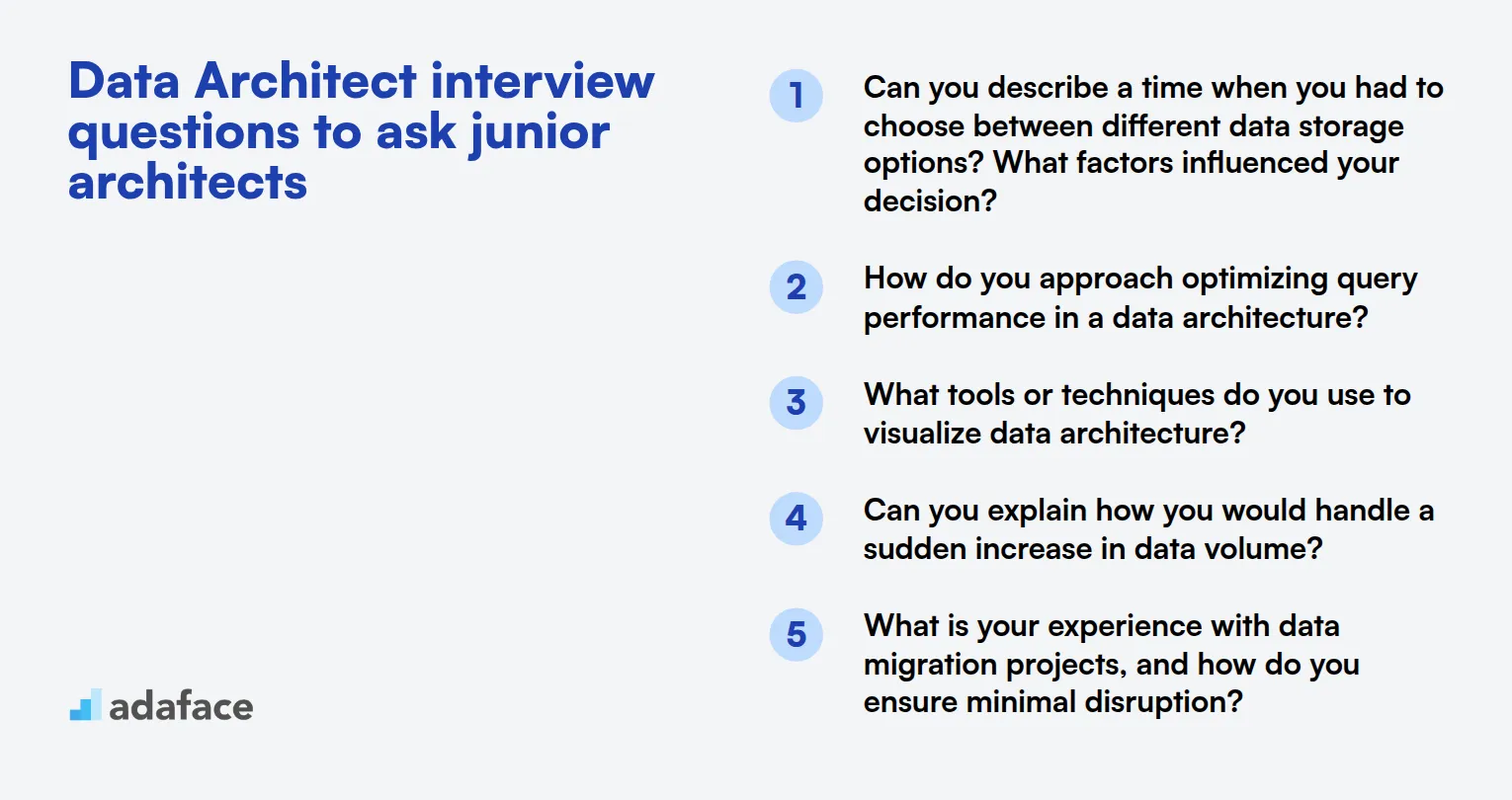
To assess whether junior data architects have the foundational knowledge needed for success, consider using this list of targeted interview questions. These questions can help uncover their understanding of data concepts and practical skills necessary for their role in your organization. For more insights on the data architect role, check out the job description.
- Can you describe a time when you had to choose between different data storage options? What factors influenced your decision?
- How do you approach optimizing query performance in a data architecture?
- What tools or techniques do you use to visualize data architecture?
- Can you explain how you would handle a sudden increase in data volume?
- What is your experience with data migration projects, and how do you ensure minimal disruption?
- How do you keep up with new trends and technologies in data architecture?
- Can you discuss a challenging data problem you solved and the approach you took?
- What role does documentation play in your data architecture process?
- How would you explain complex data architecture concepts to a non-technical stakeholder?
- What methods do you employ to validate data models before implementation?
10 intermediate Data Architect interview questions and answers to ask mid-tier architects.
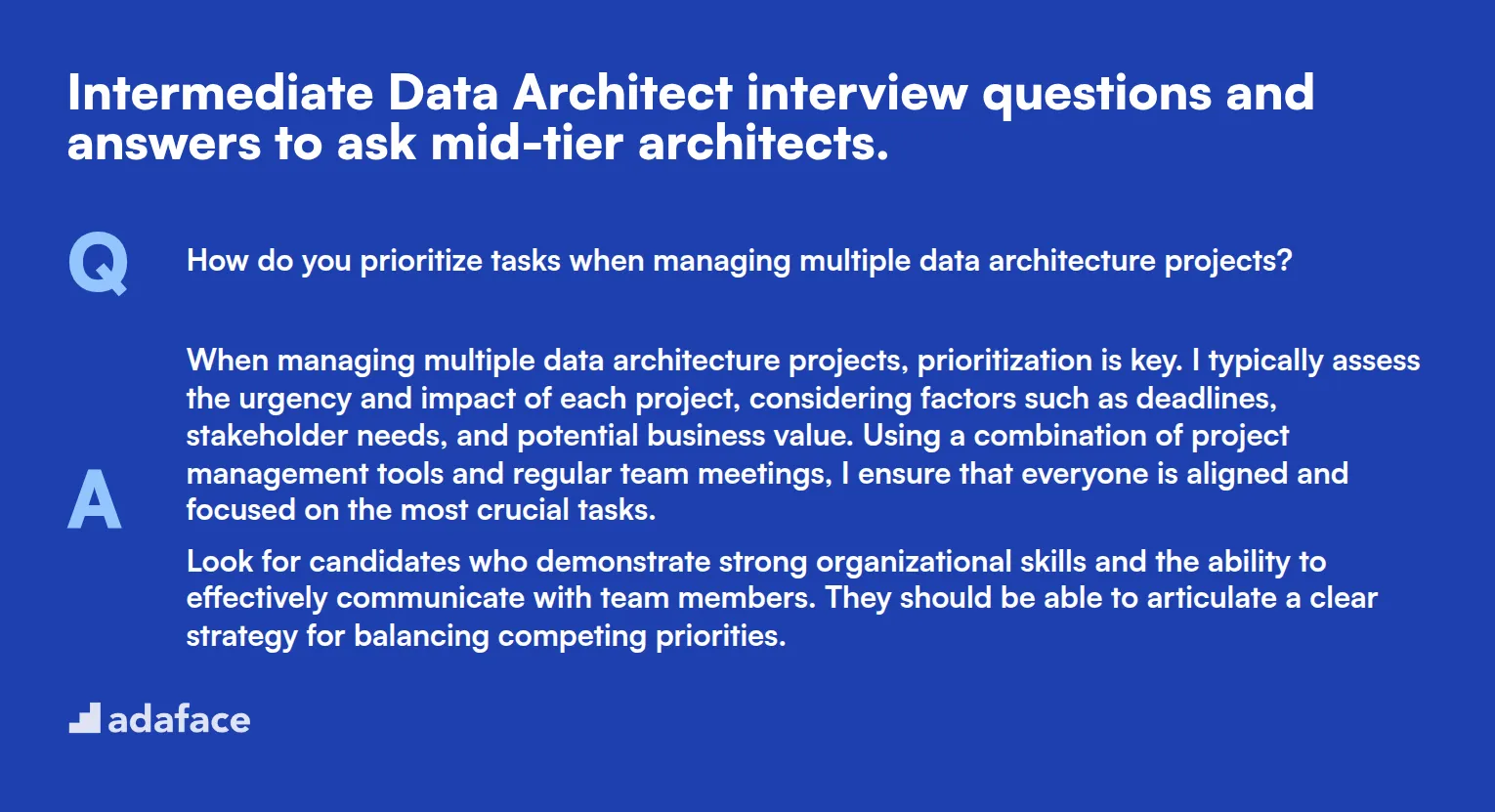
Ready to dig a little deeper with your data architect candidates? This list of intermediate questions is designed to uncover the nuanced skills and problem-solving abilities that set mid-tier architects apart. Perfect for when you need to ensure your candidate can handle the complexities of diverse data environments.
1. How do you prioritize tasks when managing multiple data architecture projects?
When managing multiple data architecture projects, prioritization is key. I typically assess the urgency and impact of each project, considering factors such as deadlines, stakeholder needs, and potential business value. Using a combination of project management tools and regular team meetings, I ensure that everyone is aligned and focused on the most crucial tasks.
Look for candidates who demonstrate strong organizational skills and the ability to effectively communicate with team members. They should be able to articulate a clear strategy for balancing competing priorities.
2. Can you discuss your approach to balancing performance and cost in data architecture?
Balancing performance and cost involves a strategic evaluation of resources and requirements. I analyze the performance needs against budget constraints, aiming to optimize data processing efficiency without overspending. This often involves leveraging cloud solutions, where I can dynamically allocate resources based on current demands.
An ideal candidate should illustrate their experience with cost-effective solutions and their ability to adapt to changing requirements. They should also mention any particular strategies or tools they use to achieve this balance, such as cost monitoring dashboards or performance tuning.
3. How do you handle changes in business requirements impacting data architecture?
Handling changes in business requirements requires flexibility and proactive communication. I collaborate closely with stakeholders to understand the new requirements and assess the implications for the existing architecture. Then, I devise a plan to adapt the architecture, ensuring minimal disruption while meeting the updated goals.
Candidates should show their ability to be adaptable and their skill in handling unexpected changes. Look for examples where they've successfully managed changes and kept projects on track.
4. What techniques do you use to ensure data quality during data transformation processes?
Ensuring data quality during transformation involves multiple techniques such as data profiling, validation rules, and transformation testing. I incorporate automated data quality checks and involve data cleansing processes to detect and correct errors early in the pipeline.
Expect candidates to mention specific tools or methodologies they use to maintain data integrity and quality, such as ETL testing or continuous monitoring frameworks. Their response should reflect a proactive approach to managing data quality issues.
5. How do you evaluate the effectiveness of a data architecture?
Evaluating the effectiveness of a data architecture involves assessing its ability to meet performance benchmarks, scalability, and alignment with business goals. Regular reviews and feedback loops with stakeholders help identify areas for improvement. I also use metrics like query response times and system uptime to measure success.
Look for candidates who emphasize continuous improvement and stakeholder engagement. They should demonstrate how they use feedback and metrics to drive architectural enhancements.
6. How do you approach the integration of new technologies into existing data architectures?
Integrating new technologies involves a thorough assessment of compatibility and potential benefits. I start with a pilot project to test the new technology in a controlled setting, followed by a phased rollout if successful. This ensures minimal disruption and allows for troubleshooting in real-world conditions.
Candidates should show an analytical approach to technology integration, highlighting their ability to manage risk and ensure seamless integration. They should mention any success stories of past integrations.
7. Can you describe your approach to managing data redundancy?
Managing data redundancy involves identifying duplicate data and implementing strategies to consolidate or eliminate it. I use techniques like data deduplication, normalization, and master data management to ensure that data is unique and consistent across systems.
An ideal candidate's response should include specific strategies or tools they have used to manage redundancy effectively, such as database cleanup schedules or centralized data repositories.
8. How do you ensure compliance with data privacy regulations in your architectures?
Ensuring compliance with data privacy regulations starts with understanding the legal requirements relevant to our industry. I implement data encryption, access controls, and regular audits to protect sensitive information. Additionally, I stay updated on regulatory changes to ensure ongoing compliance.
Look for candidates who are well-versed in data privacy laws and can articulate how they've applied these laws in their work. Their approach should include both technical and procedural safeguards.
9. What methods do you use to ensure high availability in data architecture?
Ensuring high availability involves deploying redundancy solutions, failover mechanisms, and regular backup processes. I also implement load balancing and clustering to distribute workloads evenly and prevent bottlenecks.
Candidates should highlight their experience with designing highly available systems, mentioning any specific technologies or approaches they've used. They should demonstrate a proactive approach to minimizing downtime and ensuring reliability.
10. How do you manage the lifecycle of data within your architecture?
Managing the data lifecycle involves defining clear processes for data creation, storage, usage, and deletion. I ensure that data retention policies align with both business needs and regulatory requirements, and I implement archiving strategies for historical data.
Candidates should show a comprehensive understanding of data lifecycle management, emphasizing their ability to align these processes with organizational goals. They should also mention any tools or systems they use to manage data effectively.
15 advanced Data Architect interview questions to ask senior architects

To identify top-tier candidates who can tackle complex data challenges, ask these advanced Data Architect interview questions. These queries help assess a candidate's ability to innovate and adapt in data-driven environments, ensuring they possess the depth of knowledge and experience required for senior roles.
- Can you describe your approach to managing data latency in real-time data architectures?
- How do you assess and implement data lineage tracking in your projects?
- What are your strategies for dealing with data silos within an organization?
- Can you discuss your experience with event-driven architectures in the context of data systems?
- How do you approach designing data architectures for machine learning applications?
- What considerations do you take into account when planning for disaster recovery in data architecture?
- How do you manage and mitigate risks associated with data architecture changes?
- What role does metadata management play in your data architecture designs?
- Can you explain your approach to ensuring data interoperability across different platforms?
- How do you ensure data democratization while maintaining control over sensitive information?
- What techniques do you use to architect for data observability and monitoring?
- How do you integrate data architecture practices with DevOps methodologies?
- What approaches do you use to implement distributed data processing systems?
- Can you discuss your experience with containerization in the context of data architecture?
- How do you handle legacy system integration within modern data architectures?
8 Data Architect interview questions and answers related to data warehousing
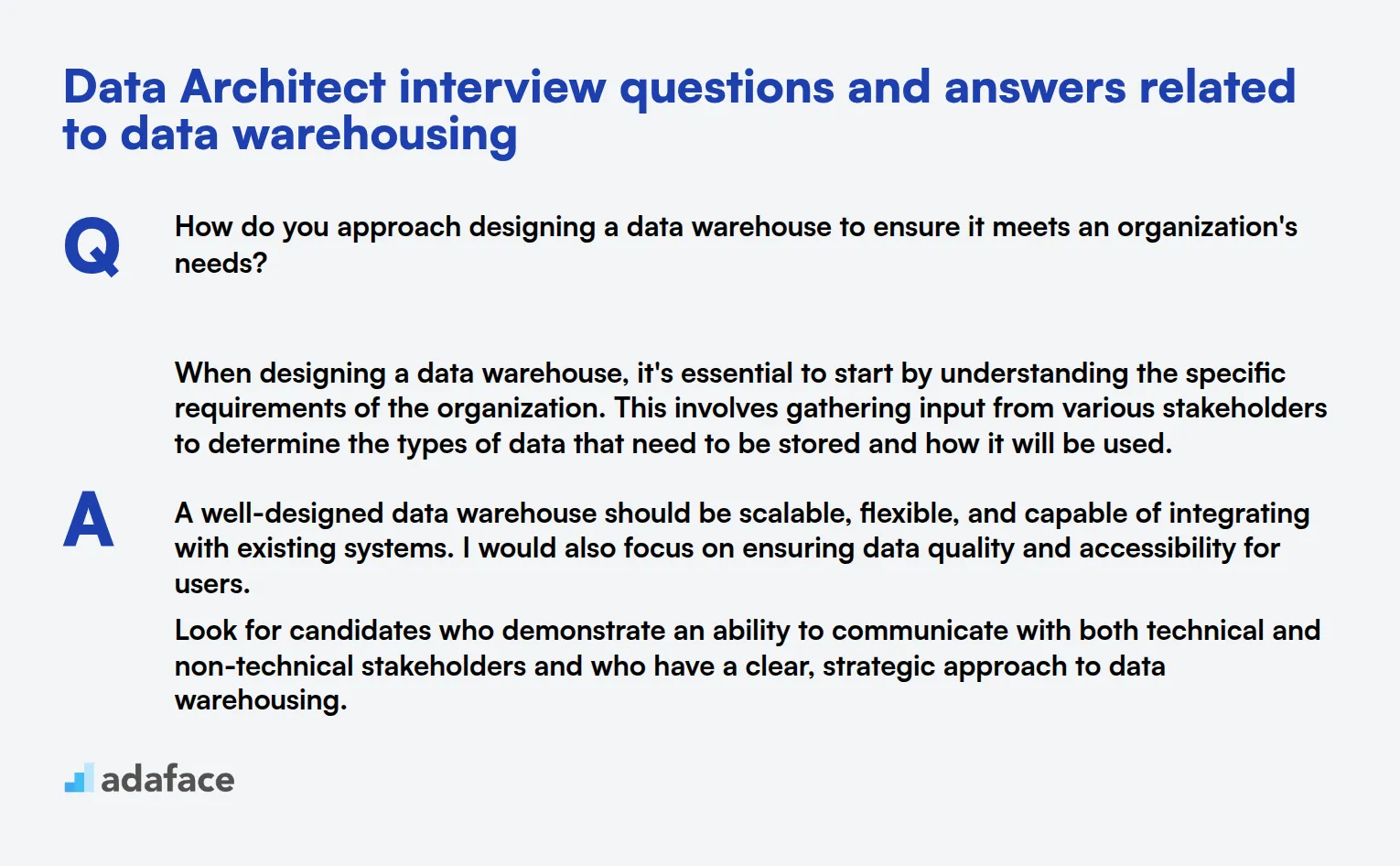
Data warehousing might sound like a place where data goes to party, but it's actually a critical part of any organization's data strategy. This list of questions is designed to help you sift through candidates like a pro, ensuring you find the right fit for your data architect needs. Use them during interviews to uncover insights into how candidates think about and handle data warehousing challenges.
1. How do you approach designing a data warehouse to ensure it meets an organization's needs?
When designing a data warehouse, it's essential to start by understanding the specific requirements of the organization. This involves gathering input from various stakeholders to determine the types of data that need to be stored and how it will be used.
A well-designed data warehouse should be scalable, flexible, and capable of integrating with existing systems. I would also focus on ensuring data quality and accessibility for users.
Look for candidates who demonstrate an ability to communicate with both technical and non-technical stakeholders and who have a clear, strategic approach to data warehousing.
2. Can you explain your process for managing and maintaining data quality in a data warehouse?
Managing data quality in a data warehouse involves several key steps, including data profiling, cleansing, and validation. It's vital to implement processes that catch errors and inconsistencies early on.
Regular audits and automated checks can help maintain data integrity over time. Additionally, it's important to set up a feedback loop with users to identify and rectify any issues quickly.
Strong candidates should articulate a clear process for ongoing data quality management and demonstrate familiarity with various tools and techniques used in data cleansing and validation.
3. How do you prioritize data to be archived versus data to be kept readily accessible in a data warehouse?
The prioritization of data depends on its usage frequency and importance to current business operations. Data that is frequently accessed or critical for decision-making should remain accessible, while older or less frequently used data can be archived.
It's important to establish clear criteria for what data gets archived, which often involves collaboration with business units to understand their needs.
Ideal candidates will show an understanding of the balance between cost-efficiency and data availability, and they should be able to discuss strategies for determining what data is essential.
4. What challenges have you faced with data warehousing, and how did you overcome them?
Common challenges in data warehousing include handling large volumes of data, ensuring data security, and maintaining data quality. In one instance, I faced an issue with data latency and solved it by optimizing our ETL processes.
Another challenge is managing evolving business requirements. I tackle this by implementing agile methodologies to adapt the data warehouse design as needs change.
Look for candidates who can articulate specific challenges they've faced and the pragmatic solutions they employed, demonstrating their problem-solving skills and adaptability.
5. How do you ensure that a data warehouse can efficiently scale with growing data volumes?
To ensure scalability, I focus on designing a modular architecture that allows components to be added or improved independently. This includes choosing scalable technologies and optimizing data storage and retrieval processes.
Implementing efficient indexing and partitioning strategies can also help manage growing data volumes effectively.
Candidates should illustrate their experience with scalable data warehouse architectures and explain how they strategically plan for future growth.
6. Describe your experience with data warehouse automation tools and how they improve efficiency.
Automation tools like ETL tools or data pipeline automation can significantly enhance the efficiency of data warehousing by reducing manual intervention and errors.
I've used tools such as Informatica and Talend to automate data loading and transformation processes, which allows for faster data processing and timely availability of reports.
Look for candidates who are familiar with a variety of automation tools and can discuss their benefits in streamlining data warehouse operations.
7. How do you keep up with the latest trends and technologies in data warehousing?
Staying current with trends and technologies in data warehousing is crucial. I regularly attend industry conferences, participate in webinars, and read relevant articles and white papers.
Networking with other professionals and participating in online forums also helps me stay informed about the latest advancements and best practices.
Candidates should show a proactive approach to continuous learning and demonstrate a genuine interest in the field by sharing specific examples of how they stay updated.
8. How do you ensure smooth data integration from various sources into a data warehouse?
Ensuring smooth data integration requires a well-structured ETL process that can handle data from disparate sources. I start by assessing the formats and structures of the data to be integrated.
Using standardized data integration tools and protocols helps maintain consistency and quality. I also ensure that there's a robust error-handling mechanism in place.
Candidates should discuss their experience with data integration challenges and solutions, emphasizing their ability to work with diverse data sources and maintain data integrity.
8 situational Data Architect interview questions with answers for hiring top architects
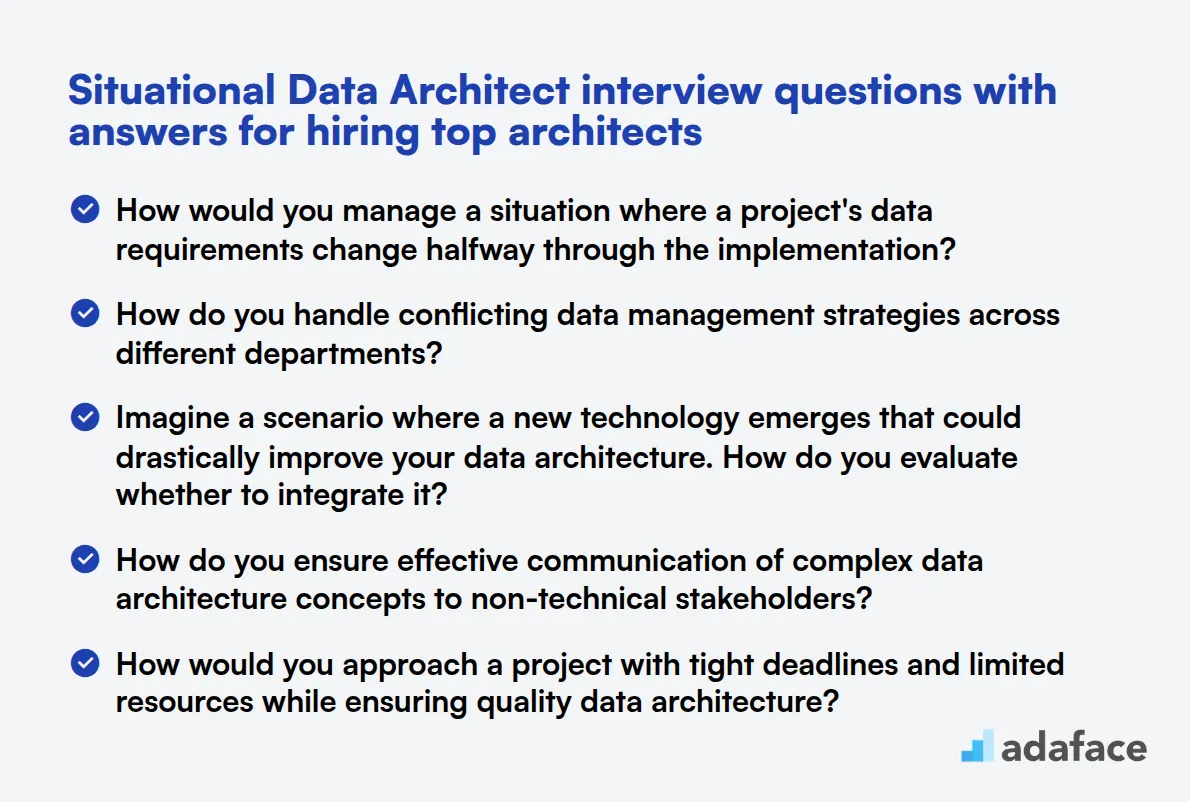
When it comes to hiring a top-notch Data Architect, situational interview questions are your secret weapon. They help you dive deep into candidates' problem-solving abilities and reveal how they react in real-world scenarios. Use these questions to gauge whether a candidate has the right mix of skills, experience, and mindset to navigate complex data environments. Plus, they're a surefire way to avoid hiring a data disaster!
1. How would you manage a situation where a project's data requirements change halfway through the implementation?
Data Architects need to be adaptable and responsive to changes in project requirements. A strong candidate might describe their process of reassessing the architecture and identifying components that need to be adjusted. They would also discuss collaborating closely with stakeholders to ensure the new requirements are well understood and documented.
Candidates should highlight their ability to balance the need for swift adjustments with the importance of maintaining data integrity and performance. An ideal response would mention the use of agile methodologies or iterative development as strategies for effectively managing change.
2. How do you handle conflicting data management strategies across different departments?
An effective Data Architect must be skilled in negotiation and communication. They should describe how they facilitate discussions between departments to find common ground and align on a unified data management strategy. This could involve setting up regular meetings, defining clear governance policies, or utilizing cross-functional teams.
The candidate should also demonstrate a strong understanding of the importance of data governance and how it can be used to resolve conflicts. Look for responses that show a balance between assertiveness in decision-making and openness to feedback from various stakeholders.
3. Imagine a scenario where a new technology emerges that could drastically improve your data architecture. How do you evaluate whether to integrate it?
A savvy Data Architect will carefully evaluate new technologies before integration. They might talk about conducting a cost-benefit analysis to weigh the potential improvements against the risks and costs involved. They should also mention staying informed about industry trends and innovations.
It's important for candidates to emphasize the role of scalability and compatibility with existing systems when considering new technologies. An ideal answer will reflect a strategic and thoughtful approach, ensuring any changes align with the organization's long-term goals and infrastructure capabilities.
4. How do you ensure effective communication of complex data architecture concepts to non-technical stakeholders?
Communicating complex data concepts in a digestible manner is crucial for a Data Architect. Candidates might explain their use of visual aids, such as diagrams or flowcharts, to simplify information. They could also mention tailoring their language to the audience's level of technical understanding.
Effective responses will highlight the importance of active listening and adapting communication styles to meet the needs of diverse stakeholders. Look for candidates who demonstrate empathy and clarity in their explanations, ensuring the entire team is on the same page.
5. How would you approach a project with tight deadlines and limited resources while ensuring quality data architecture?
In such scenarios, prioritization and resource management are key. A competent Data Architect might discuss their approach to identifying critical components of the architecture that must be delivered first. They should also mention leveraging existing tools and frameworks to expedite the process.
Candidates should showcase their ability to maintain high standards of quality while working under pressure. An ideal response would include examples of past projects where they have successfully balanced tight constraints with the delivery of robust data solutions.
6. How do you handle a situation where a critical system goes offline, affecting the data architecture?
Handling system outages requires a calm and systematic approach. Candidates might describe their process for quickly diagnosing and isolating the issue, followed by implementing contingency plans, such as failover systems or backup solutions.
The candidate should demonstrate a strong understanding of crisis management and disaster recovery strategies. Look for responses that highlight their ability to minimize downtime and communicate effectively with team members and stakeholders during emergencies.
7. How do you ensure data architecture aligns with an organization's business goals?
Aligning data architecture with business goals involves continuous collaboration with business leaders and stakeholders. Candidates might discuss their process of understanding business objectives and translating them into technical requirements.
An ideal response would emphasize the importance of regular reviews and updates to the data architecture to ensure it remains aligned with evolving business strategies. Candidates should highlight their ability to integrate business insights into data architecture decisions.
8. What strategies do you use to manage and mitigate risks in data architecture projects?
Risk management is a critical aspect of data architecture. Candidates might describe their approach to identifying potential risks early in the project lifecycle and developing mitigation strategies, such as redundant systems or contingency plans.
The response should include examples of how they have successfully managed risks in past projects. Look for candidates who demonstrate a proactive and comprehensive approach to risk management, ensuring the robustness and reliability of data architecture solutions.
Which Data Architect skills should you evaluate during the interview phase?
While it is difficult to evaluate every aspect of a candidate's capabilities in a single interview, it is essential to focus on key skills that are critical for a Data Architect. The following skills are core to their role and should be carefully assessed to ensure the candidate's fit for your organization.
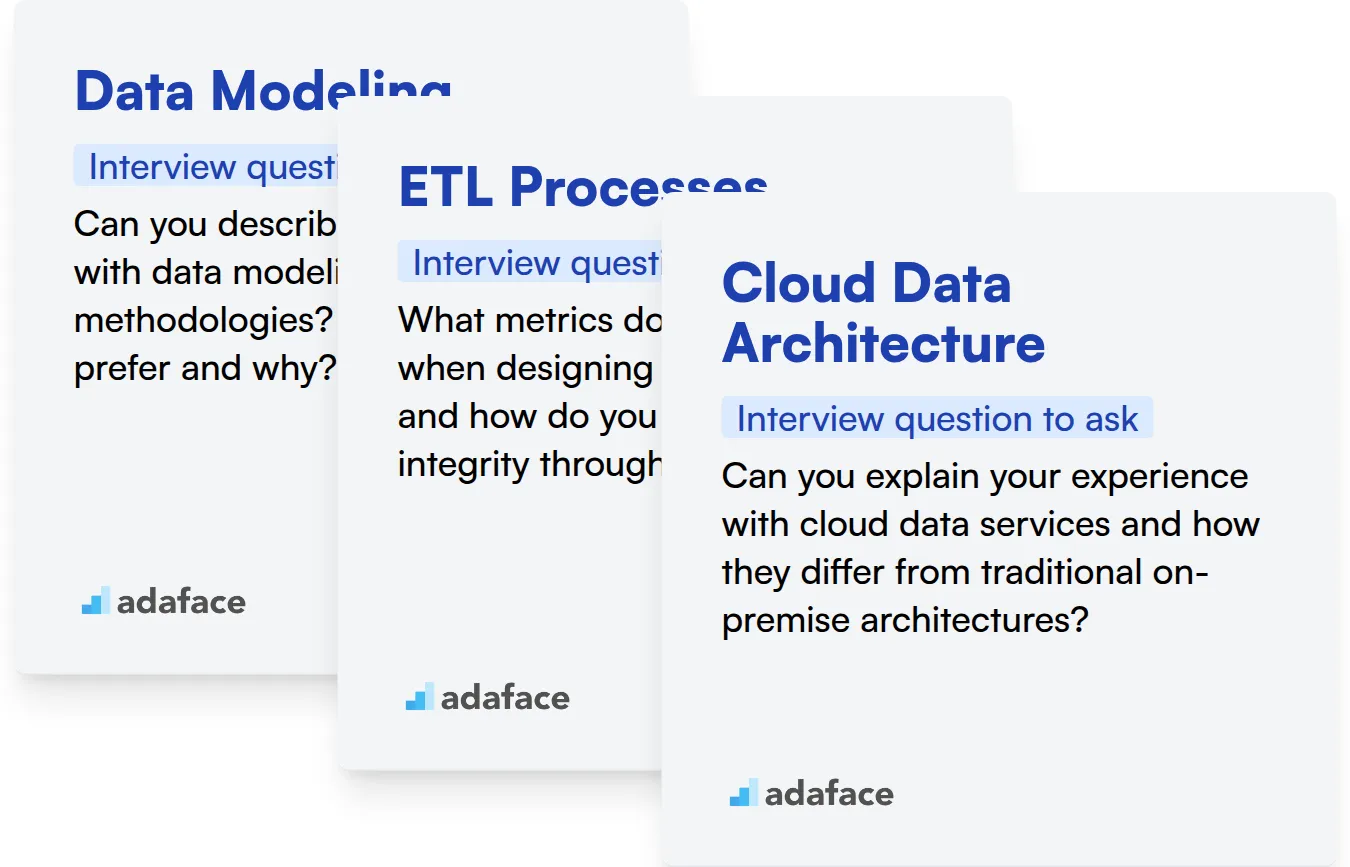
Data Modeling
To evaluate data modeling skills effectively, consider using an assessment test that includes relevant multiple-choice questions. You can explore our test on Data Modeling to assess this skill.
In addition to assessments, targeted interview questions can also provide insight into a candidate's data modeling capabilities. Consider asking the following question:
Can you describe your experience with data modeling tools and methodologies? Which do you prefer and why?
When asking this question, look for the candidate's familiarity with various data modeling tools and their ability to articulate the reasons behind their preferences. An effective Data Architect should demonstrate a solid understanding of different methodologies and how they apply to real-world scenarios.
ETL Processes
To gauge a candidate's understanding of ETL processes, administering a test with specific multiple-choice questions can be helpful. You might find our ETL online test useful for this purpose.
You can also evaluate their ETL skills through a structured interview question. A suggested question is:
What metrics do you consider when designing an ETL process, and how do you ensure data integrity throughout the pipeline?
When posed with this question, pay attention to the candidate's ability to discuss specific metrics, best practices, and their approach to maintaining data integrity. A well-rounded response indicates a strong grasp of ETL principles.
Cloud Data Architecture
An assessment test featuring multiple-choice questions on cloud data architecture can effectively filter candidates proficient in this area. Unfortunately, we currently do not have a specific test in our library dedicated to this skill.
To further assess this competency, consider asking the candidate:
Can you explain your experience with cloud data services and how they differ from traditional on-premise architectures?
Look for insights into the candidate's experience with specific cloud services, their understanding of differences in architecture, and how they leverage cloud capabilities to enhance data services.
3 Tips for Using Data Architect Interview Questions
As you get ready to put your interview strategy into action, here are our tips to refine your approach and ensure a successful hiring process.
1. Incorporate Skill Tests Before Interviews
To ensure the candidates meet the required technical standards, using skill tests before interviews can be very effective. Skill tests act as a preliminary filter, allowing you to assess competencies in a structured manner.
Consider using tests like the Data Modeling Test for evaluating data modeling skills, or the ETL Online Test for assessing ETL processes. Tests like the Cloud Computing Online Test can also be beneficial if your architecture involves cloud solutions.
Implementing these tests aids in identifying candidates with the right expertise and saves time during interviews by focusing on those who have already demonstrated technical competence.
2. Compile the Right Amount of Interview Questions
Due to time constraints, it’s important to select a balanced mix of questions that cover key skills and competencies. Carefully compiling questions maximizes your ability to assess candidates effectively.
In addition to data architecture-specific questions, consider incorporating questions from related areas, such as Data Science, to evaluate analytical skills or Cloud Computing for cloud-related knowledge.
This strategic selection of questions will allow you to gauge the candidate's proficiency in critical areas, ensuring a well-rounded assessment.
3. Ask Follow-Up Questions
Merely asking standard interview questions may not provide a complete picture of the candidate's abilities. Follow-up questions can help uncover deeper insights and verify authenticity.
For instance, after asking a candidate how they handled a complex data migration project, follow up with: "What specific challenges did you face, and how did you overcome them?" This helps you assess their problem-solving skills and adaptability.
Use targeted interview questions and skill tests to hire talented Data Architects
When hiring for roles requiring data architecture skills, it's important to ensure candidates possess the necessary expertise. The most effective way to assess these skills is by using targeted skill tests like our Data Modeling Test or ETL Online Test. These assessments help in accurately identifying top talent.
After utilizing these tests to shortlist the best candidates, invite them for interviews to further evaluate their capabilities. To streamline your hiring process, you can sign up for our platform here or explore our online assessment platform for more resources.
Data Modeling Skills Test
Download Data Architect interview questions template in multiple formats
Data Architect Interview Questions FAQs
A Data Architect should have strong database design skills, knowledge of data modeling techniques, understanding of big data technologies, and experience with data integration and ETL processes.
Use specific questions about data warehouse architectures, ETL processes, and dimensional modeling to evaluate a candidate's expertise in data warehousing.
Advanced topics include data governance, cloud data architecture, real-time data processing, and data security in distributed systems.
Use situational questions that present real-world scenarios and ask candidates to explain their approach to solving complex data architecture challenges.

40 min skill tests.
No trick questions.
Accurate shortlisting.
We make it easy for you to find the best candidates in your pipeline with a 40 min skills test.
Try for freeRelated posts
Free resources




